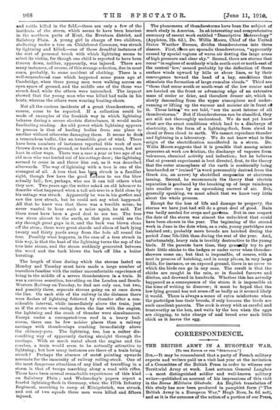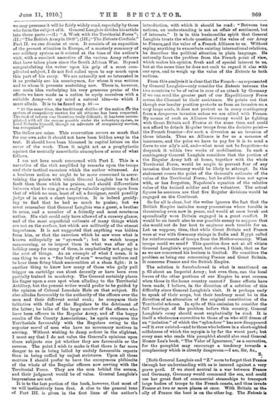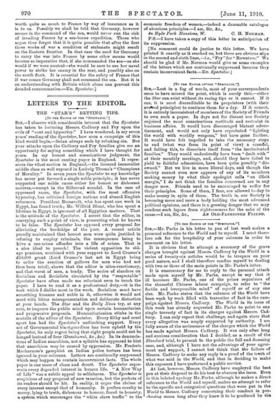CORRESPONDENCE.
THE BRITISH ARMY IN A EUROPEAN WAR.
[To TEE EDITOR OP TRH "SPECTATOR."] Sin,—It may be remembered that a party of French military experts and writers paid WI a visit last year at the invitation of a Committee of the British Press in order to witness our Territorial Army at work. Last autumn General Langlois —a most distinguished soldier and well-known military writer—published an account of his impressions of this visit in the Revue MiUtaire Generale. An English translation of this study has now been produced in pamphlet form (" The British Army in a European War," Hugh Rees, ls. 6d. net), and as it is the outcome of the action of a portion of our Press,
we may presume it will be fairly widely read, especially by those who form the subject of it. General Langlois divides his article into three parts :—(I.) "A Week with the Territorial Force"; (II.) "The British Army in 1909 "; (III.) "The Entente Cordials." Part IL we can dismiss at once. It consists of an exposition of the present situation in Europe, of a masterly summary of our military system as it existed at the time of the author's visit, with a succinct narrative of the various Army reforms that have taken place since the South African War. Beyond congratulating the writer upon his grip of a most com- plicated subject, I do not feel called upon to say much upon this part of his essay. We are naturally not so interested in it as probably are his countrymen, for whom it was written and to whom it presents something new. There is, however, one main idea underlying his very generous praise of the efforts we have made as a nation to equip ourselves with a suitable Army—to my mind a natural idea—to which I must allude. It is to be found on p. 46 :-
" At the same time, the traditional dislike of the nation ftr the system of compulsory service for all citizens has been respected. The task of reform was therefore truly difficult; it has been accom- plished with all the success possible under the voluntary system, as Lord Roberts himself, though an advocate of compulsory service, has recognised."
The italics are mine. This reservation covers so much that for our own sake it should not have been hidden away in the text. It should have been blazoned in capital letters on the cover of the work. Then it might act as a prophylactic against the mentally anaesthetic atmosphere of some of what follows.
I am not here much concerned with Part I. This is a narrative of the visit amplified by remarks upon the troops and their tactical exercises which the author witnessed. As a business nation we ought to be more concerned in ascer- taining the points with which General Langlois has to find fault than those which he praises, and should differentiate between what he can give a really valuable opinion upon from that of which no man, least of all a foreigner, could possibly
judge of in such a short inspection. It is indeed gratify- ing to find that he had so much to praise; but we must remember that General Langlois was a guest, a brother
in arms, and a member of a frieadly and most courteous nation. His visit could only have allowed of a cursory glance, and of the most superficial estimate of many things which are not on the surface, but which are militarily of the utmost importance. It is not suggested that anything was hidden from him, or that the exercises which he saw were what is known colloquially as " eyewash " ; but to watch troops manoeuvring, or to inspect them in what was after all a holiday camp for many of them, is emphatically not going to the root of things. As an example of what I mean, it is one thing to see a "fine body of men" wearing uniform and to hear them firing blank ammunition at a sham fight: it is another thing to know how many of those who gaily pull trigger on cartridge can shoot decently or have been even partially trained in musketry. The General certainly places his finger upon a sore spot when alluding to the Territorial Artillery, but the present writer would prefer to be guided by the opinion of Colonel Lonsdale Hale on that subject. He also alludes favourably to the authority of the officers over the men and their different social rank; he compares their initiative with that of the Regulars to the detriment of the latter ; he talks of the large number of the officers who have been officers in the Regular Army, and of the happy results of the County Associations; he again compares the Territorials favourably with the Regulars owing to the superior moral of men who have no mercenary motives in serving. Without wishing to damp ardour in the slightest, I must say that I do not value the General's opinions upon these subjects one jot whether they are favourable or the reverse. The point I wish to make is that there is far more danger to us in being lulled by unduly favourable reports than in being ruffled by unjust strictures. Upon all these
matters I should prefer to have the anonymous plebiscite of the whole of the Regular officers now serving with the Territorial Force. They are the men behind the scenes, and their judgment would be of value. General Langlois's
impressions are not.
It is to the last portion of the book, however, that most of us will instinctively turn first. A clue to the general tone of Part III. is given in the first lines of the author's
introduction, with which it should be read : " Between two nations, an understanding is not an affair of sentiment, but of interests." It is in this businesslike spirit that General Langlois treats the whole question of the value of our Army to France.. and the value of a French Alliance to us. Without saying anything to exacerbate existing international relations, he describes the political situation in plain language. He naturally faces the problem from the French point of view, which makes his opinion fresh and of special interest to us, but at the same time he does not omit to regard it also with our eyes, and to weigh up the value of the Entente to both nations.
From this analysis it is clear that the French—as represented
by General Langlois—only consider the Entente between the two countries to be of value in case of an attack by Germany if we can send the greater part of our Expeditionary Force across the Channel to their assistance. He points out that though our insular position protects us from an invasion on a very large scale, it does not protect us in every contingency from a dangerous invasion unless we are allied with France. By means of such an Alliance Germany would be fighting with Great Britain and France at the same time, and could not afford to detach Regular troops from the decisive point—
the French frontier—for such a diversion as an invasion of these islands. Thus an Alliance is for us a measure of insurance, and the price we have to pay for it is to send a force to our ally's aid, and—what must not be forgotten—to despatch it within two weeks of mobilisation. In such a contingency General Langlois considers that the portion of the Regular Army left at home, together with the whole Territorial Force, would be ample to prevent fear of any invasion that Germany would be likely to attempt. In this statement comes the point of the General's estimate of the value of the Territorial Force; but he either does not agree with, or has forgotten, Napoleon's equation of the relative value of the trained soldier and the volunteer. The actual figures he assumes are that five Regular divisions would be engaged on the Continent.
So far all is clear, but the writer ignores the fact that the
British Empire includes many possessions where trouble is threatening even now in peace, and would at once break out sporadically were Britain engaged in a great conflict. It would be an insult also to our possible enemy to suppose that she would not do her best to engineer such trouble for us. Let us suppose, then, that while Great Britain and France were at war with Germany risings in India and Egypt called for reinforcements of troops from the Mother-country. What troops could we send P This question does not at all vitiate General Langlois's argument, but shows, I think, that as far as we are concerned his horizon is limited. He considers the problem as being one concerning France and Great Britain. It concerns France and the British Empire.
The solution is foreshadowed in what is mentioned on
p. 63 about an Imperial Army ; but even then, can the local forces of the other portions of our Empire be sent oversee. when those in the home country cannot P Some efforts have been made, I believe, in the direction of a solution of this difficulty since General Langlois's visit. It is perhaps early to speak of their scope, but their tendency must be in the direction of an alteration of the original constitution of the Territorial scheme. In spite of this omission to consider the full bearings of the problem before this country, General Langlois's essay should most emphatically be read. It is itself a wholesome corrective to those of us who still dream of an "isolation" of which the " splendour " has now disappeared —if it ever existed—and to those who believe in a short-sighted selfishness of which the myopia is by far the worst part; but every man who reads this pamphlet should also read General Homer Lea's book, " The Valor of Ignorance," as a corrective, for the pamphlet may encourage a tendency towards a complacency which is already dangerous.—I am, Sir, dec.,
Z.
[Both General Langlois and "Z." seem to forget that France through her understanding with us is insured against a very grave peril. If we stood neutral in a war between France and Germany, Germany would command the sea, and could use her great fleet of commercial steamships to transport large bodies of troops to the French coasts, and thus invade France at two or more places at once. With Britain as the ally of France the boot is on the other leg. The Entente is
worth quite as much to France by way of insurance as it is to us. Possibly we shall be told that Germany, however secure in the command of the sea, would never run the risk of invading France by a sea-borne expedition. Those who argue thus forget that it is quite possible that after the first three weeks of war a condition of stalemate might result on the Eastern frontier. In that case the need for Germany to carry the war into France by some other means would become so imperative that, if she commanded the sea—as she would if we were neutral—she would be sure to use her naval power to strike her enemy in the rear, and possibly also on the south flank. It is essential for the safety of France that if war comes Germany shall not command the sea. But it is an understanding with Britain which alone can prevent this dreaded consummation.—En. Spectator.]
















































 Previous page
Previous page